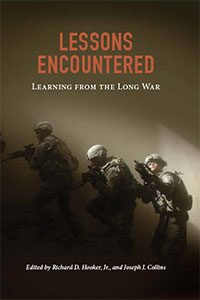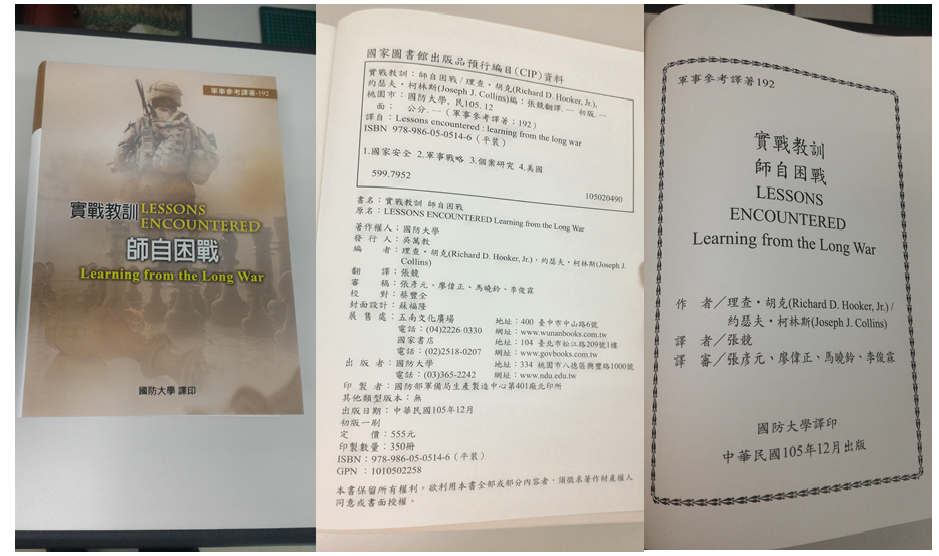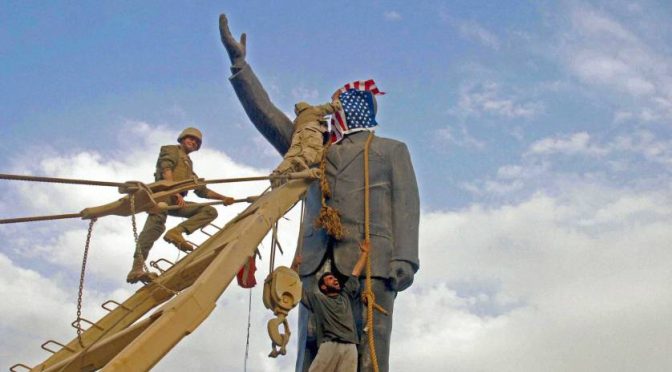Hooker, Richard D., and Joseph J. Collins. Lessons Encountered: Learning from the Long War. National Defense University Press 2015 473pp.

By Ching Chang
Lessons Encountered: Learning from the Long War is a collection of research reports edited by Richard D. Hooker, Jr. and Joseph J. Collins published by the U.S. National Defense University Press in September 2015. It originated from a top-down request from the Chairman of the Joint Chiefs of Staff to respond to two inquiries: What were the costs and benefits of the campaigns in Iraq and Afghanistan, and what were the strategic lessons of these campaigns? The final product of this instruction may eventually benefit many military professionals, and possibly, certain politicians who may have ambitions to be the national or political leadership within the national security community of the United States.
Success could never be easily repeated by itself, yet, mistakes causing failures always repeatedly occur in different occasions in human history. When conducting a war, mistakes happen everywhere from the strategic level jointly formulated by the national leadership and their subordinated senior military commanders, to those operational and tactical decisions made by the military professionals in varying levels of command and authority. Certain tactical decisions may have some devastating consequences at the strategic level. Specific bias and selfishness in higher level decision making may increase the statistics of fatalities in the battlefield. To grasp the mistakes that have occurred in the history of war is more important, therefore, than understanding the rationales assuring victory, since all the theories of victory are fundamentally similar. Following previous tracks, however, is no guarantee of success. Such is the well-known truth for every military professional.
Of course, this publication is tailored for senior military professionals who may attend the Joint Professional Military Education programs offered by war colleges or command and staff colleges in various services of the United States Armed Forces. Nonetheless, senior national security civilian executives who also join these courses may also enhance their understanding of coordination with military professionals. On the other hand, how the military professionals should serve their political masters by following the principle of civilian control of the military is another vital issue addressed by this publication. The best lesson of this masterpiece is to help the leadership of the national security community learn principles related to advocating armed conflict, as opposed to the opposite approach of gaining awareness only through battlefield experience and lost blood and treasure.
Many lessons encountered and learned during the campaigns in Afghanistan and Iraq are listed at the beginning of this text. The whole course of these two warfighting cases include high tier decision-making processes as well as very detailed situations of the battlefield, described and analyzed thoroughly.
Any war itself is essentially a dynamic process. Situation assessment and adaptations at the strategic, operational, and tactical levels are routines for warfighting. Likewise, the associated politics are also a dynamic progression. Criteria changes are necessary to reflect the concerns from the general public. Positions and arguments held by political leadership may also vary accordingly. From observing the developments of establishing the security in these two different battlefields and the exit strategy formulated by the U.S. political leadership for two different operational situations, we may notice the difficulties inherent in conducting two simultaneous campaigns.
The legal issues discussed in the final chapter may be the most striking content to readers whose concerns include the directives and moral cause for fighting the next war. However, the sincerity of self-criticism is valid evidence that conscience remains a central element of military ethics. Likewise, the courage to face those mistakes is the fundamental indication of hegemony. Many people may question how long the United States may sustain its position as a superpower in the world. As long as the United States military produces such reports that honestly review all the mistakes, oversights, and downright stupidities that occur in their war efforts, no one should underestimate the capacity of the United States to amend those mistakes at some point. Particularly, many of the military professionals interviewed and pointed out those flaws may have the possibility to continue their careers in the political realm in the foreseeable future. We may discover how well they may perform after shifting their roles to be politically appointed features in Washington.

As a foreign reader and translator reading this text, the author would like to mention that the Chinese translation of this book was recently published by the National Defense University, Republic of China, in December 2016. As many other civilizations pay their efforts to understand the United States by translating these texts, we hope that the United States should also pay the same scale of effort to understand other civilizations in order to avoid the many mistakes analyzed in this book. After all, si vis pacem, para bellum, is quite true, yet, the Chinese wisdom of “winning a war without fighting” can also be worthy of consideration after reading this text.
Ching Chang is a Research Fellow with the Society for Strategic Studies, Republic of China. The views expressed in this review are his own.
Featured Image: by Ron Haviv, April 9 2003, Reproduced as part of TIME’s series, A Decade of War in Iraq.

